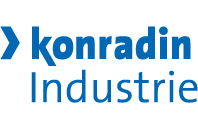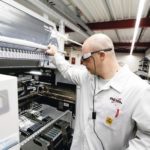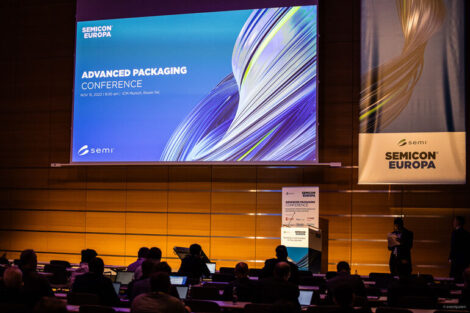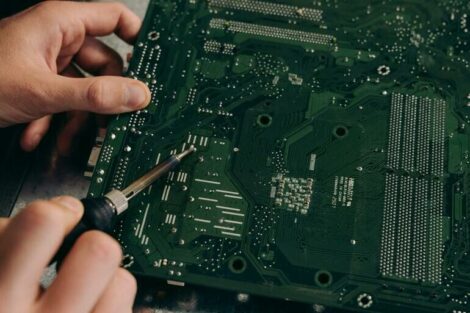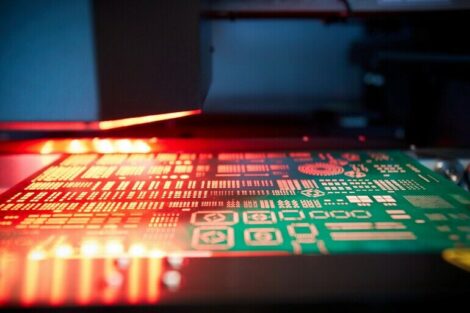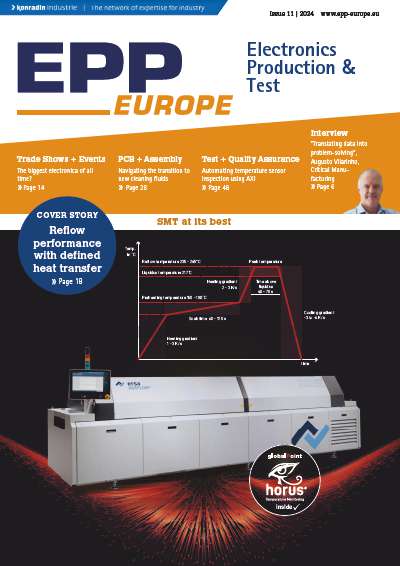EPP Europe: The industrial and economic recovery from the coronavirus is currently underway as government restrictions are starting to be lifted. Have there been any consequences for the company so far? Will the current market situation significantly impact the company this year?
Guenter Lauber: The past year has been extremely challenging – for our customers and partners as well as for us. But our teams, globally, have responded in an excellent way. What also helped was that the global push towards digitalization and major trends like 5G, Smart Factory and Smart Home triggered new growth impulses with many of our customers despite the pandemic. And in some special segments such as advanced packaging, the rapidly rising demand gave us sales increases of more than 50 percent. We also raised our sales in the SMT Solutions segment. During all this, we benefited from our global presence, our strong customer service, and our modern product portfolio, all of which are perfect for times like these. And with the coming easing of restrictions, we expect the broad recovery in the global economy – in some cases with extensive catch-up effects. Accordingly, we have good reasons to be optimistic.
EPP Europe: How have the recent changes as a result of the pandemic affected ASM? Was the company prepared?
Guenter Lauber: Our primary focus was on protective measures for our employees all over the world. As far as keeping our customer supplied with products and spare parts, our global presence was a great strength. Our production network with factories in the EU, Great Britain and Asia is set up in such a way that we can produce virtually all machines, components, and solutions anywhere. This flexible and highly resilient network allowed us to supply our customers consistently, with very few delays. In addition, we are present in all regions with offices and service hubs. And where customers had to close their factories to outside visitors, we could support them very successfully with remote services.
A key reference block was our Industry Survey 2020, a global survey on coronavirus measures and resiliency. From the answers and conversations, we knew early on under what difficult conditions the companies had to operate in the different parts of the world. Together with our customers, we developed solutions ranging from remote services, online training seminars and modified spare parts stockpiling up to even acting as an agent for production capacities in our customer network. Our regional teams were familiar with the local conditions, which helped us a lot. We stayed permanently in touch with our customers. To summarize it in two words: We were very agile and resilient.
EPP Europe: Are you planning to attend any trade shows this year, either online or in person (if permitted)?
Guenter Lauber: We have been very successful in developing various online formats, ranging from streaming events for launching new product innovations, technical process webinars and online workshops as well as the ASM Academy with many free training videos and augmented reality techniques for our customers. We also moved most of the activities in our five SMT Centers of Competence worldwide, which are very popular with customers and partners, to the virtual world with great success. We conduct complete customer applications and transmit them live to our individual customers at their facilities.
But direct, personal contacts deliver more than just information. I am looking forward to attending trade fairs and industry meetings again where we can enjoy meetings with customers and partners in person again. On the other hand, I am convinced that hybrid concepts will play a huge role in the future. We will not ignore the benefits of online interactions in all segments but develop them further.
EPP Europe: You recently had the digital Winter 2021 release “ASM Impact”. What were the key highlights, and how have your customers responded thus far?
Guenter Lauber: More than two thousand electronics manufacturers from all over the world have already attended the ASM Impact streaming events, which we host twice a year in summer and winter. One highlight was the introduction of the new Si place TX micron. This extremely fast and precise machine for high-volume advanced packaging applications underscores our leadership in best-in-class placement solutions. We also introduced many software innovations for the integrated Smart Factory, including ASM Works the world’s first integrated software suite for all parts of smart electronics production.
I am also very proud of our ASM Factory Equipment Center. The new software offers customers a centralized asset and maintenance management system that handles everything from planning to checklists for maintenance technicians to a central reporting archive. And it does this not just for ASM equipment but for machines from any manufacturer. In addition, we are offering this software for the first time based on a flexible and scalable rental model. Since renting minimizes the investment costs and risks for the electronics manufacturer, it will be an important model for future software distribution.
EPP Europe: Automation and digitalization are important to achieve a Smart Factory. What is ASMPT doing to approach an integrated and connected factory? How would you support manufacturers with their digital transformation?
Guenter Lauber: Whether they are interested in placement solutions and printers, open interfaces, networking, integrated software, artificial intelligence, autonomous process control with the ASM ProcessLens or the modern MES systems from ASMPT software subsidiary Critical Manufacturing – we offer the central building blocks of the integrated Smart Factory and are the supplier of choice for many electronics manufacturers worldwide. We have achieved this role in recent years, but the roads to the integrated Smart Factory are as individual as the companies themselves.
One lesson we have learned from current projects is that we need much more openness. Openness with regard to solutions, openness in the discussions between electronics manufacturers and solution suppliers, and openness within the companies themselves. In order to break down silos, the companies must bring together management, process technicians, production managers and IT engineers in these projects, and in certain phases also the users. To do this, some have set up digital factory teams for this purpose – a promising approach. We as a solution provider must then contribute broad hardware, software, networking, system design and process competencies via our own teams of experts.
EPP Europe: What are your recommendations when integrating or synchronizing all production processes to reach Industry 4.0?
Guenter Lauber: Giving general advice is difficult in this context. What is clear, however, is that networking and process integration can generate huge efficiencies. To do this, we at ASMPT rely on a step-by-step, agile approach in close coordination with the customer. If you want to be able to integrate new technologies and components in the future, you need solutions that are open and modular. For example, some manufacturers rely on proprietary solutions for setup changeovers and refills on their machines. For customers, this means that they might get locked into a vendor or technology for the long term, which is risky and undesirable.
We at ASMPT believe that the integration of autonomously traveling robots is a much more future-proof approach. Only an integrated Smart Factory that follows a modular approach allows customers to make improvements by exchanging individual components at any time relatively easily and independently of each other. In our example, this would be the placement solution, the robots, the planning software, or the material management system.
EPP Europe: Where do you and the company see the future of production? Any significant future trends?
Guenter Lauber: Smart automation will be a major challenge in the coming years. Unlike many Industry 4.0 visionaries, I do not believe in dark factories or lights-out scenarios for most electronics factories. Total automation is technically complex, which makes it very expensive and – most importantly – overly rigid. But companies will have to operate with more flexibility and in a more order-oriented manner in the future.
Accordingly, the goal is finding the right balance. I believe that factories will increasingly operate with small teams of smart operators that work factory wide. They will be supported by software systems, real-time sensor readings, remote technologies, and AI systems. Simple activities in areas such as logistics will be automated, but for complex activities, people are simply the most flexible solution, particularly when they receive smart support.
EPP Europe: Is the company ready for these trends? Will customers be able to use their current systems for these future challenges, or will an upgrade or even a new system be needed?
Guenter Lauber: Yes, I believe that ASMPT is in a very good position. We want to support customers with the impending migration to the integrated Smart Factory, and we are able to do so. For example, we have long offered uniform software for all machines, and the ASM Works software suite proves that our software solutions operate in an integrated manner. With the ASM ProcessExpert, we have the first self-learning inline SPI that not only optimizes printing processes fully automatically but adjusts placement processes by communicating with AOI solutions from other manufacturers and uses virtual prints based on Gerber data to provide targeted and concrete tips for optimizing stencil designs.
Our ability to develop such trailblazing innovations is encouraging for the future. But we are only at the beginning of this journey. New technologies alone are not enough – our customers and we as an integrated solution provider must also change operating processes, organizational structures, work cultures and communication if we want them to work efficiently. And we, as a technology partner, must prove that the digital transformation and innovative sol utions truly pay for themselves and generate big advances in competitiveness and efficiency for our customers. So, there is a lot left to do. I am looking forward to these next few years.
Thank you very much for your time, Mr. Lauber. (ch)
ASM Assembly Systems GmbH & Co. KG
Rupert-Mayer-Strasse 48
81379 Munich Germany
Tel.: +49 89 20800 27819
E-Mail: smt-solutions.de@asmpt.com
Website: www.asm-smt.com
Interview with Reckewerth ASM Senior Director Global Marketing
